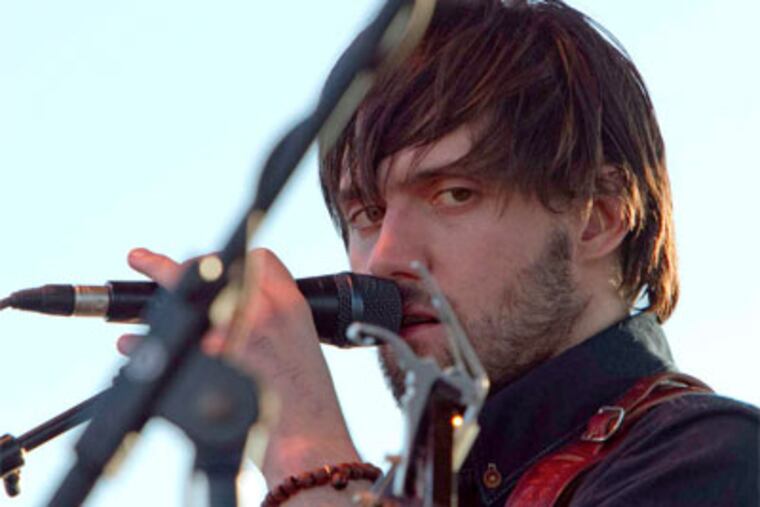A chat with Conor Oberst
Ever since he began playing shows in his hometown of Omaha, Neb., when he was 12 years old, Conor Oberst has been a busy man.

Ever since he began playing shows in his hometown of Omaha, Neb., when he was 12 years old, Conor Oberst has been a busy man.
The gifted lyricist, now 32, has a reputation as an indie folk-rock oracle, recording with musicians Mike Mogis and Nate Walcott as Bright Eyes, under his own name, and with side projects such as the agit-punk band Desaparecidos and the indie super-group Monsters of Folk.
On Sunday, Oberst will make a rare, almost-solo appearance at the Kimmel Center's Verizon Hall. Without a new album - his most recent is Bright Eyes' The People's Key (2011) - the troubadour will be surveying his two-decade career and serving up new songs. Speaking this week from New York - he splits time between there and Omaha - the songwriter talked about where he's been and where he's going.
Question: Tell me about this tour.
Answer: It's just extremely stripped-down. Originally it was going to be a true solo show, but I got a little bit of cold feet, and got one friend of mine, this guy Ben Brodin, to come and play on about half the songs. He plays vibraphone and guitar and piano. But for the most part it's straight up, the songs on guitar and piano, from all my records.
Q: Is this an opportunity to look back and sum up?
A: It does seem to be a transitional time, and a good time to play all of the old songs and new songs and see how they fit together. . . . I find that not just with my music but in general I like to hear things in their simplest, most basic form.
Q: As you put it in "Moab" [from the 2008 album Conor Oberst], is there "nothing that the road cannot heal"?
A: It's a good motto. Makes you feel better. I'm not sure how true it is.
Q: The Austin songwriter Daniel Johnston is opening for you. He's a hero of yours, isn't he?
A: Yeah, absolutely. I think he's a great songwriter. And though a lot of his songs are simplistic, they have all the necessary elements of a good pop song, a good catchy melody, great words.
Q: There's an innocence about his stuff. And there's a thread running through your songs of trying to get back to a purer form of emotional expression. In "Soul Singer in a Session Band," from Cassadaga (2007), you beat yourself up with the line "I was a hopeless romantic, now I'm just turning tricks."
A: When I started writing songs, I was doing it for myself and a small circle of friends. And gradually, over the years, an audience became involved. And then a business, or occupation, grew out of that. It began to be a bit of a maze, internally: What is this all about? Why am I doing this? I think it's natural to question all of those things. . . . Not that I've totally figured it all out, but it's the only thing that's . . . made me feel like I have a purpose, and I'm doing what I'm supposed to be doing.
Q: You were a vocal supporter of Barack Obama in 2008, but criticized him pretty harshly during his first term. How are you feeling about it now?
A: I'm absolutely happy he won. I voted for him. I gave him money, which was something I wasn't sure I was going to do, but I broke down after, like, the 4,000th e-mail he sent me. I think that from a domestic standpoint he's been a great president. Great advocate for women's rights, for gay rights. . . . What I have a problem [with] comes in the way he's doubled down on the prosecution of war on terror, when it comes to indefinite detentions and the NSA spying on U.S. citizens without warrants.
Q: Earlier this year, you released a single, "MariKKKopa," and toured with your political punk-rock band Desaparecidos, with whom you hadn't put out an album for a decade. Is there more to come?
A: They haven't announced it yet, but we are going to do some more shows, and put out more music next year.
Q: What's happening next?
A: My main thing is just to keep writing. I've been doing some songwriting that's for my own record, I suppose. That'll happen next year, probably under my own name.
Q: There have been a lot of reports suggesting you've retired Bright Eyes. True?
A: No. I love playing with Mike and Nate. Hopefully, we'll do that sometime in the near future. . . . They both worked on a movie called Writers that I wrote a song for that will be out next year.
Q: What's your chief responsibility as a songwriter?
A: Wow. I don't know, I guess I wouldn't call it a responsibility. Because I think that with anything creative you should have the freedom to experiment, and that experimentation means not feeling totally responsible for how other people perceive it. But I think for me, my favorite experience is meeting a 15- or 16-year-old kid who comes to a show, and you can just tell they're really sincere and they're like, "Your music has meant so much to me and it got me through this difficult time, or kept me company through this part of my life."
That's the reason to share art. Art is basically communication, and I think everyone who's a music lover has had that experience where a record or a recording has kept you company when no one else is around. And I think that is what I'm hoping that people get out of my music.